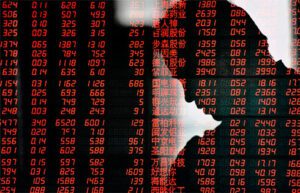
Stock indices of the largest countries in the Asia-Pacific region ended trading on Monday with a fall on expectations of further tightening of monetary policy in the world.
Investors this week will follow the meetings of a number of central banks in the world. The US Federal Reserve System (FRS) will announce the rate change decision on Wednesday, the Bank of Japan and the Bank of England – on Thursday. Most experts believe that the US and British regulators will once again raise key rates to combat inflation that has been beating many years of records.
In addition, it is expected that meetings of the central banks of Switzerland, Sweden, Turkey and China will take place. The People’s Bank of China will announce the rate on loans to first class borrowers (LPR) for one year and five years on Tuesday.
At the same time, trades in the Asia-Pacific region were inactive on Monday. Stock exchanges in Japan are closed due to the country’s celebration of Honoring the Elderly Day.
China’s Shanghai Composite fell 0.35%, while Hong Kong’s Hang Seng shed 1%.
The shares of pharmaceutical companies Sino Biopharmaceutical Ltd. fell most significantly on the Hong Kong Stock Exchange. (-6.9%) and Wuxi Biologics (Cayman) Inc. (-5%), development Longfor Group Holdings Ltd. (-6%) and Country Garden Holdings Co. Ltd. (-3%), as well as IT companies Alibaba Group Holding Ltd. (-3.5%) and Netease Inc. (-3.6%).
Construction Paper China Vanke Co. Ltd. lost 1.2% in price. A division of the company – Onewo Inc. plans to list in Hong Kong and raise 6.15 billion Hong Kong dollars ($783.5 million).
The value of the South Korean index Kospi decreased by 1.1%.
Shares of one of the world’s largest manufacturers of consumer electronics LG Electronics Inc. shed 0.2%, while rival Samsung Electronics Co. rose by 0.3%. Capitalization of automaker Kia Corp. falls by 0.4%.
The Australian S&P/ASX 200 fell 0.3%.
The market value of the world’s largest mining company BHP fell by 0.6%. Oil companies Woodside Energy and Santos lost 1% and 0.8%.
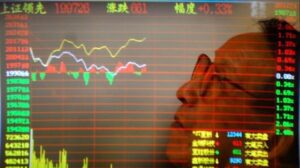
Stock indices of the largest countries in the Asia-Pacific region opened trading on Monday with a decrease on expectations of further tightening of monetary policy in the world.
Investors are preparing to follow the meetings of a number of central banks of the world this week. The US Federal Reserve System (FRS) will announce the rate change decision on Wednesday, the Bank of Japan and the Bank of England – on Thursday. Most experts believe that the US and British regulators will once again raise key rates to combat inflation that has been beating many years of records.
At the same time, trades in the Asia-Pacific region on Monday are inactive. Stock exchanges in Japan are closed due to the country’s celebration of Honoring the Elderly Day.
China’s Shanghai Composite fell 0.16% by 8:10 am KST, while Hong Kong’s Hang Seng shed 1%.
The stocks of pharmaceutical companies Sino Biopharmaceutical Ltd are depreciating most significantly on the Hong Kong Stock Exchange. (-6.6%) and Wuxi Biologics (Cayman) Inc. (-5.1%), development Longfor Group Holdings Ltd. (-5.9%) and Country Garden Holdings Co. Ltd. (-5%), as well as IT companies Alibaba Group Holding Ltd. (-3.4%) and Netease Inc. (-3.1%).
Construction Paper China Vanke Co. Ltd. lose 1.7% in price. A division of Onewo Inc. plans to list in Hong Kong and raise 6.15 billion Hong Kong dollars ($783.5 million).
The value of the South Korean index Kospi by 8:20 KSK decreased by 1.1%.
Shares of one of the world’s largest manufacturers of consumer electronics LG Electronics Inc. depreciate by 0.3%, the shares of its competitor Samsung Electronics Co. – by 0.2%. Capitalization of automaker Kia Corp. falls by 0.1%.
The Australian S&P/ASX 200 fell 0.07% since the market open.
The market value of the world’s largest mining company BHP is down 0.1%. Oil companies Woodside Energy and Santos lost 1% and 0.8%.
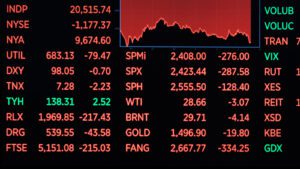
Stock indices of the largest states of the Asia-Pacific region on Thursday change without a single dynamics.
The People’s Bank of China injected 400 billion yuan ($57.9 billion) into the financial system as part of the medium-term lending program (MLF). At the same time, the rate on loans for a period of one year, issued under the MLF, was maintained at the level of 2.75% per annum.
Analysts also did not expect a change in the rate, notes Trading Economics.
China’s Shanghai Composite index fell 1.2% by 8:29 qoq, while Hong Kong’s Hang Seng added 0.4%.
The shares of developers Country Garden Holdings Co. have risen most significantly on the Hong Kong Stock Exchange. (+9.1%), Longfor Group Holdings Ltd. (+6.2%) and China Resources Land Ltd. (+5.9%).
In addition, quotes of insurer Ping An (+1.9%), oil CNOOC (+1.6%), Budweiser Brewing Co. APAC Ltd (+1.4%).
Meanwhile, shares of automakers Geely (-2.8%) and BYD (-1.7%) show a decrease in value.
The value of the Japanese index Nikkei 225 to 8:25 square meters increased by 0.2%.
Growth leaders include cosmetics company Shiseido (+2.1%), railway operator East Japan Railway (+2%), automotive Suzuki Motor (+1.8%) and Nissan Motor (+1.7%), manufacturer of game consoles Nintendo (+1.7%).
At the same time, the prices of papers of metal producers, including Toho Zinc Co., are falling. (-2.8%), Nippon Steel Corp. (-2.2%), Kobe Steel (-1.7%).
Japan increased exports in August by 22.1% compared to the same month last year. The rise was recorded following the results of the eighteenth month in a row.
Imports soared 49.9%, pushing the trade deficit to a record 2.817 trillion yen.
The value of the South Korean index Kospi to 8:25 q decreased by 0.3%.
Shares of one of the world’s largest manufacturers of chips and consumer electronics Samsung Electronics Co. fell 1.1%, while automaker Hyundai Motor added 0.25%.
The Australian S&P/ASX 200 rose 0.3% since the market open.
The market value of the world’s largest mining companies BHP and Rio Tinto increased by 0.5% and 0.2%, respectively. Oil companies Woodside Energy and Santos rose 4.4% and 3.5%.
Unemployment in Australia rose unexpectedly to 3.5% in August. A month earlier, it was at a record low of 3.4%, and analysts did not predict changes.
The increase in unemployment occurred for the first time in the last ten months.
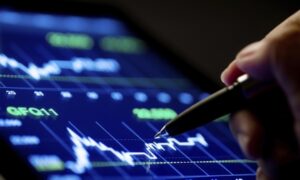
Stock indices of Western European countries are steadily rising during trading on Friday, following Wall Street and Asian stock markets.
The composite index of the largest companies in the Stoxx Europe 600 region increased by 1.41% by 11:28 Moscow time and amounted to 419.92 points.
The German DAX rose 1.59%, the French CAC 40 rose 1.5%, and the British FTSE 100 rose 1.41%. The Italian FTSE MIB and the Spanish IBEX 35 gained 1.88% and 1.65% respectively.
Investors continue to evaluate the results of the meeting of the European Central Bank (ECB).
The ECB raised the base rate on loans to 1.25% per annum, the rate on deposits – up to 0.75%, the rate on margin loans – up to 1.5%. He also announced his intention to continue raising rates in the next few meetings.
ECB President Christine Lagarde said during a press conference following the meeting that further rate increases will be determined by incoming statistical data.
The ECB raised its forecast for consumer price growth this year to 8.1%, next year to 5.5%, and in 2024 to 2.3%. In June, the bank’s analysts estimated these figures at 6.8%, 3.5% and 2.1%, respectively.
According to the new forecast, the GDP of the Eurozone in 2022 will increase by 3.1% against the previously estimated 2.8%. However, expectations for the coming year are worsened to 0.9% from 2.1%, for 2024 – to 1.9% from 2.3%.
Meanwhile, the energy crisis remains a reason for investors’ fears. Market participants are worried about the consequences of the crisis on the eurozone economy, writes Trading Economics.
Statistics released on Friday showed that industrial production in France fell in July for the first time since April, indicating that companies are cutting production amid slowing demand and high price pressures.
The indicator decreased by 1.6% in monthly terms after rising by 1.2% in June. Economists polled by The Wall Street Journal had expected a 0.5% decline in industrial production.
Among the growth leaders among the components of the Stoxx Europe 600 indicator are shares of the German energy company Uniper SE, which are rising in price by 10.5%.
Shares of London Security PLC are down 4.8%. The British fire protection company cut its pre-tax profit in the first half of the year amid rising costs due to inflationary pressures.
ASOS PLC added 1.6%. The British retailer is forecasting FY22 revenue and earnings in line with analysts’ expectations, but said August sales were weaker than expected.
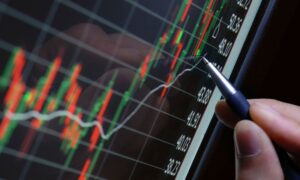
Stock indices of the largest countries in Western Europe show weak and multidirectional changes during trading on Tuesday.
The composite index of the largest enterprises in the Stoxx Europe 600 region by 11:27 Moscow time increased by 0.15% and amounted to 413.99 points.
The German DAX indicator rose by 0.07%, the British FTSE 100 – by 0.2%, the Spanish IBEX 35 – by 0.03%. The French CAC 40 fell 0.07%, while the Italian FTSE MIB shed 0.33%.
Traders this week are looking forward to the meeting of the European Central Bank (ECB), which will be held on Thursday. At a meeting in July, the European Central Bank raised rates for the first time in 11 years, by 50 bp at once. The base interest rate on loans was raised to 0.5%, the rate on deposits – to zero, the rate on margin loans – to 0.75%.
The volume of orders of industrial enterprises in Germany in July fell by 1.1% compared to the previous month, the German Ministry of Economics reported.
Analysts on average expected a decline of 0.5%, according to data from Trading Economics. In June, according to revised data, the indicator fell by 0.3%, and not by 0.4%, as previously reported.
Shares of Volkswagen AG rise in price by 2.7%. The German carmaker has confirmed its intention to list the shares of luxury sports car manufacturer Porsche AG. The IPO could be the largest in German history and the largest in Europe since 1999, according to Refinitiv data.
Deutsche Lufthansa AG added 0.3% in price. The German airline will continue negotiations with the pilots’ union to avoid a strike that would lead to the cancellation of numerous flights.
Finnair Oyj’s shares are up 0.5%, although the Finnish carrier cut passenger numbers by 12% in August compared to the previous month.
Among the growth leaders among the components of the Stoxx Europe 600 index are shares of the German food delivery service Delivery Hero SE, which added 7.5%.
In addition, shares of Polymetal International PLC (+7.4%) and British bakery chain Greggs PLC (+6.7%) are steadily rising in price.
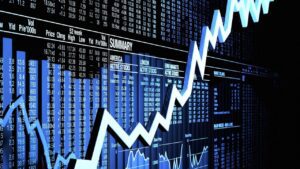
Stock indices of the largest countries in the Asia-Pacific region (APR) do not show a single dynamics during trading on Tuesday.
The Japanese Nikkei 225 rose by 0.02% by 08:35 Moscow time.
Consumer spending in Japan rose 3.4% year-on-year in July, official statistics show. Analysts on average predicted an increase of 4.2%.
The growth leaders among the components of the index are shares of the chemical Unitika Ltd., which add 7.5%, the leaders of the fall are the papers of the electricity distribution company Tokyo Electric Power Co. Holdings Inc. (-four%).
Asia’s largest clothing retailer Fast Retailing is up 0.1%, automaker Nissan Motor Co. – decrease by 0.75%.
The Chinese Shanghai Composite index added 1.11% by 08:40 Moscow time, while the Hong Kong Hang Seng fell by 0.16%.
The People’s Bank of China (PBOC, the country’s central bank) intends to lower the required reserve ratio (RRR) for banks by 200 points, to 6%, starting from September 15, the regulator said. The decision was made against the backdrop of the fall of the Chinese yuan to its lowest value in two years, writes Trading Economics.
The leaders of the decline are the shares of car dealer Zhongsheng Group Holdings Ltd. (-4.9%), Alibaba Health Information Technology Ltd., which provides services for the collection and use of medical data, (-4.3%) and one of the largest bottled water producers in China, Nongfu Spring Co. Ltd. (-2.6%).
The South Korean Kospi index rose by 0.12% by 08:35 Moscow time.
Shares of one of the world’s largest manufacturers of chips and consumer electronics Samsung Electronics Co. fell by 0.18%, while automaker Hyundai Motor – rose by 0.25%.
The Australian S&P/ASX 200 is down 0.36% since the market opened.
The Reserve Bank of Australia (RBA) raised its key rate by 50 basis points for the fourth time in a row amid efforts to fight inflation, while warning of its readiness to continue tightening monetary policy.
The key rate was raised on Tuesday to 2.35% from 1.85%. Since May, the regulator has increased it by a total of 225 basis points – the highest rate of monetary tightening in almost 30 years, writes MarketWatch.
Consumer confidence in Australia rose 1.3% last week, hitting its highest since early June, according to ANZ Bank’s weekly survey.
Meanwhile, Australia’s current account surplus widened to A$18.3 billion in the second quarter from A$2.8 billion in the same period a year earlier, official statistics showed.
The market value of the world’s largest mining companies BHP and Rio Tinto decreased by 1% and 1.1%, respectively. Rio Tinto has entered into a binding agreement with Turquoise Hill Resources Ltd. about the acquisition of the remaining shares of the copper producer, which it does not already own, Rio Tinto said in a statement.